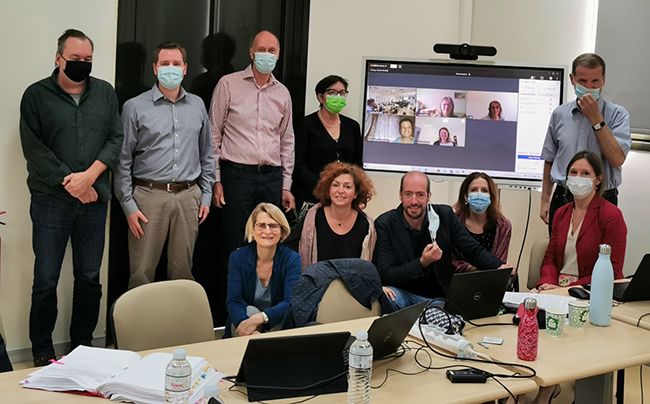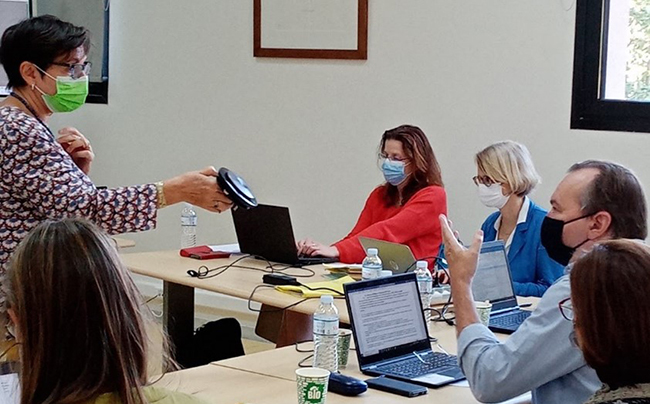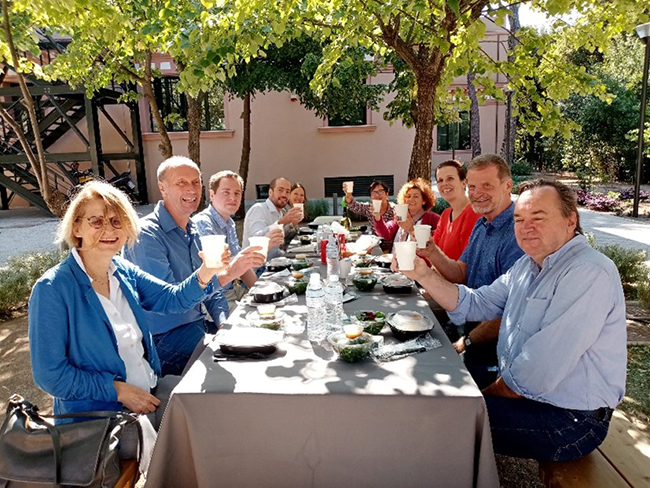
65th Meeting of the Panel on Phytosanitary Measures
Athens, 2021-10-05/07
The Panel met on 2021-10-05/07 at the Benaki Phytopathological Institute (BPI, Athens). The main task of this Panel is to evaluate risks presented by specific pests and design phytosanitary measures to avoid their introduction and spread.

Alert, A1 and A2 Lists
Recent additions to the Alert List were presented to the Panel. Following the recent revisions of EU and EurAsian Economic Union (EAEU) lists, an overview of the differences between EPPO, EU and EAEU lists was discussed. Given the experience gathered with a similar exercise performed in the 1990s (over 8 years, on about 100 pests). Panel members were encouraged to identify some priority pests that would require special attention.
Pest Risk Analysis
During the Panel, the following national/EU pest risk analyses (PRAs) were discussed:
- British PRA on Dendroctonus valens
 (Coleoptera: Scolytidae): This pest was identified in 2021-06 by the Working Party as the highest priority for an EPPO PRA in 2022. The Panel suggested that a PRA report is prepared based on the UK PRA and that organizing an expert working group (EWG) was not needed.
(Coleoptera: Scolytidae): This pest was identified in 2021-06 by the Working Party as the highest priority for an EPPO PRA in 2022. The Panel suggested that a PRA report is prepared based on the UK PRA and that organizing an expert working group (EWG) was not needed. - Dutch assessment on Spodoptera ornithogalli
 (Lepidoptera: Noctuidae) (and other American Spodoptera species) : The Panel considered that this assessment, plus the additional information provided in an appendix to the draft PRA report, was an appropriate basis for an EPPO recommendation. The PRA report for S. ornithogalli (possibly extended to S. praefica) will be finalized and reviewed at the next meeting of the Panel.
(Lepidoptera: Noctuidae) (and other American Spodoptera species) : The Panel considered that this assessment, plus the additional information provided in an appendix to the draft PRA report, was an appropriate basis for an EPPO recommendation. The PRA report for S. ornithogalli (possibly extended to S. praefica) will be finalized and reviewed at the next meeting of the Panel. - EFSA pest categorization on tomato leaf curl New Delhi virus
 (ToLCNDV, Begomovirus): An EWG met in 2021-08 to finalize the draft PRA report, which was further reviewed by the Panel. The PRA report will be presented at the next Working Party with the objective to recommend the addition of ToLCNDV to the EPPO A2 List.
(ToLCNDV, Begomovirus): An EWG met in 2021-08 to finalize the draft PRA report, which was further reviewed by the Panel. The PRA report will be presented at the next Working Party with the objective to recommend the addition of ToLCNDV to the EPPO A2 List. - EFSA pest categorization on non-EU grapevine viruses
 :
:
- The PRA report for grapevine red blotch virus, with the last changes made by the Panel, will be presented at the next Working Party with the objective to recommend its addition to the EPPO A1 List.
- The Panel agreed that the information available on temperate fruit decay-associated virus was not enough to support an EPPO recommendation. The EPPO Secretariat will monitor any new information arising on this virus.

The Panel agreed that the EPPO Secretariat should revise the Guidance document PM 5/5 Decision-support scheme for an express Pest Risk Analysis ![]() to include further guidance on listing pests below species level, in particular following ISPM 1 principles, and on how to take trade data into account when rating the likelihood of entry.
to include further guidance on listing pests below species level, in particular following ISPM 1 principles, and on how to take trade data into account when rating the likelihood of entry.
The Panel was updated concerning the latest developments on the platform to exchange information on national PRA ![]() . A circular will be sent again to the EPPO countries that do not have access yet to the restricted part of the platform, which includes more information.
. A circular will be sent again to the EPPO countries that do not have access yet to the restricted part of the platform, which includes more information.
Risk management measures
The Panel discussed generic conditions for establishing a pest free area, a pest free place of production and a pest free production site for particular Meloidogyne species, which will be finalized in a dedicated EWG with Panel members.
As recommended by the Working Party in 2021-06, the Panel revised the PRA for Orgyia leucostigma to restrict the risk management measures to the main woody hosts. Consultation of the Working Party on the revised document will be organized by email to allow publication of the PRA by the end of 2021.
Standards
The Panel reviewed a revised version of PM 4/17 Pathogen-tested olive trees and rootstocks amended in an EWG comprising Italian and Spanish experts. Because the experts from the EWG disagreed on the impact assessment of strawberry latent ringspot virus and cherry leafroll virus in olive, and on the risk of transfer of arabis mosaic virus to other hosts; the Panel recommended that an additional EWG is organized to specifically discuss the pest status of these viruses.
Update on projects
An update on the recent reports of Euphresco ![]() projects of interest for the Panel was made, as well as on the FAO Project on Spodoptera frugiperda
projects of interest for the Panel was made, as well as on the FAO Project on Spodoptera frugiperda ![]() . An internet page providing links to EPPO and other international resources for S. frugiperda is available here.
. An internet page providing links to EPPO and other international resources for S. frugiperda is available here.
Other
The EPPO Secretariat intends to organize a joint session of the Working Party on Plant Protection Products and of the Working Party on Phytosanitary Regulations in 2023 to ‘consider links between phytosanitary regulations and plant protection products policy at national and regional levels; whether and how these might be improved.’ The Panel had a preparatory discussion on how the meeting should be organized to exchange ideas on possible synergies. The Panel suggested that the areas of work, as well as some success stories and less-successful stories could be presented. Specific scenarios highlighting key issues were identified as a basis for discussion.
The next Panel meeting is planned on 202-03-16/18 at the EPPO headquarters in Paris (if the COVID-19 pandemic situation allows).

